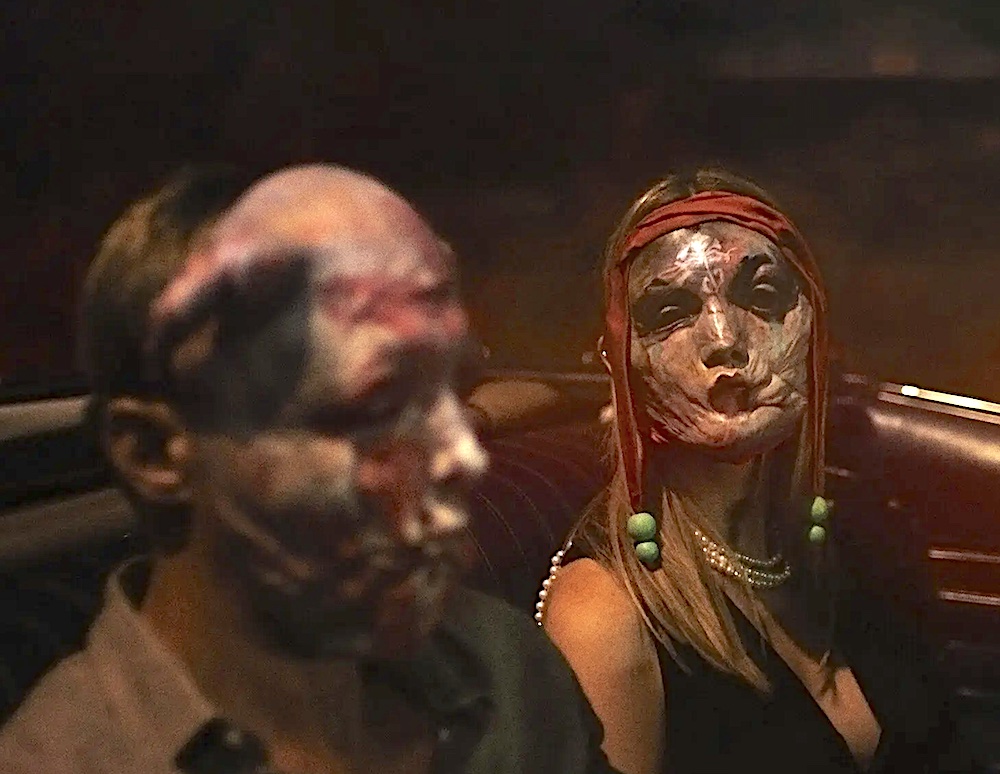Infinity Pool review - it's like The White Lotus on bad acid | reviews, news & interviews
Infinity Pool review - it's like The White Lotus on bad acid
Infinity Pool review - it's like The White Lotus on bad acid
Brandon Cronenberg's third feature is a nightmare journey into horror-tourism

Director Brandon Cronenberg has inherited his father David’s eye for the twisted and the sinister. After the creepy mind-meld dystopia of 2020’s Possessor, Infinity Pool finds Cronenberg turning his attention to horror-tourism. It’s like The White Lotus on bad acid.
Infinity Pool is set in the fictional coastal nation of Li Tolqa – the film was shot in Croatia, but wherever it is, Li Tolqa is an impoverished police state with a draconian legal system which stipulates the death penalty for all crimes. Queasily inverted camera angles and shots of a menacing sunset and dark, roiling waves suggest that this paradise may be long-lost.
We meet James Foster (Alexander Skarsgård) and his wife Em (Cleopatra Coleman), a couple who evidently have a few issues lurking not far beneath the surface. James is a novelist, though his sole published effort was six years earlier and was a resounding flop. He doesn’t seem convinced that he was ever supposed to be a writer, and the cushioning effect of the extreme wealth of his wife’s family has left him resentful and disillusioned.
 All of which makes him fair game for a group of sleazy sensation seekers who have found Li Tolqa to be the destination of their dreams. However, this is not because of the scenery or the weather, as James discovers. It all begins when he meets fellow guests Gabi and Alban Bauer (Mia Goth and Jalil Lespert) at their luxury resort hotel. It’s Gabi (an imperious performance by Goth) who breaks the ice, professing groupie-like enthusiasm for James’s novel. The two couples team up for a day of driving around the countryside, which might have seemed harmless except for the part where Gabi surprises James by giving him a hand-job (complete with a startlingly graphic ejaculating-penis shot). Not that he makes much effort to stop her (pictured above, Goth goes gun-crazy).
All of which makes him fair game for a group of sleazy sensation seekers who have found Li Tolqa to be the destination of their dreams. However, this is not because of the scenery or the weather, as James discovers. It all begins when he meets fellow guests Gabi and Alban Bauer (Mia Goth and Jalil Lespert) at their luxury resort hotel. It’s Gabi (an imperious performance by Goth) who breaks the ice, professing groupie-like enthusiasm for James’s novel. The two couples team up for a day of driving around the countryside, which might have seemed harmless except for the part where Gabi surprises James by giving him a hand-job (complete with a startlingly graphic ejaculating-penis shot). Not that he makes much effort to stop her (pictured above, Goth goes gun-crazy).
Things begin to spin out of control. James is arrested after their car hits a pedestrian, and under local law the victim’s son is entitled to execute him. However, there is a loophole. If he can stump up a thick wad of cash, he can have a clone of himself created which can be executed in his stead.
This clearly demands some suspension of disbelief, not least regarding how a ramshackle country prone to widespread corruption might be equipped with incredible futuristic cloning technology. However, it gives Cronenberg a vehicle for an oblique commentary on capitalist exploitation, racism and the vapid decadence of the amoral rich, as James is drawn into Gabi and Alban’s ring of sensation-seeking freaks.
 Themes of identity and loss thereof start to creep in as James finds himself embroiled in drug-addled orgies with this unsavoury cabal. Though one of the cops insists that “our country is not a playground for foreign children”, that’s exactly what it is, a honey-trap for voyeurs and thrill-junkies who feel only contempt for the local population (illustrated in the way Gabi and her friends toy carelessly with grotesque ethnic masks, pictured above). This audience of ghouls are thrilled to watch the slaughter of the clones, and James is sucked into a vortex of self-annihilation which plays out all too literally.
Themes of identity and loss thereof start to creep in as James finds himself embroiled in drug-addled orgies with this unsavoury cabal. Though one of the cops insists that “our country is not a playground for foreign children”, that’s exactly what it is, a honey-trap for voyeurs and thrill-junkies who feel only contempt for the local population (illustrated in the way Gabi and her friends toy carelessly with grotesque ethnic masks, pictured above). This audience of ghouls are thrilled to watch the slaughter of the clones, and James is sucked into a vortex of self-annihilation which plays out all too literally.
It’s a powerful theme, occasionally leavened by flashes of satirical black humour, and Skarsgård skilfully portrays a man watching in disgust as his soul is sucked out of him, but the film feels stretched at two hours. Chaotic, psychedelic scenes of sexual abandon veer remorselessy into gross-out territory, and Cronenberg is a sucker for bouts of slash-and-gore that keep on running long after their point has been made (it’s probably in his chromasomes). Yet there’s no denying that Infinity Pool lingers malevolently in the mind.
Add comment
The future of Arts Journalism
You can stop theartsdesk.com closing!
We urgently need financing to survive. Our fundraising drive has thus far raised £49,000 but we need to reach £100,000 or we will be forced to close. Please contribute here: https://gofund.me/c3f6033d
And if you can forward this information to anyone who might assist, we’d be grateful.

Subscribe to theartsdesk.com
Thank you for continuing to read our work on theartsdesk.com. For unlimited access to every article in its entirety, including our archive of more than 15,000 pieces, we're asking for £5 per month or £40 per year. We feel it's a very good deal, and hope you do too.
To take a subscription now simply click here.
And if you're looking for that extra gift for a friend or family member, why not treat them to a theartsdesk.com gift subscription?
more Film
 Train Dreams review - one man's odyssey into the American Century
Clint Bentley creates a mini history of cultural change through the life of a logger in Idaho
Train Dreams review - one man's odyssey into the American Century
Clint Bentley creates a mini history of cultural change through the life of a logger in Idaho
 Palestine 36 review - memories of a nation
Director Annemarie Jacir draws timely lessons from a forgotten Arab revolt
Palestine 36 review - memories of a nation
Director Annemarie Jacir draws timely lessons from a forgotten Arab revolt
 Die My Love review - good lovin' gone bad
A magnetic Jennifer Lawrence dominates Lynne Ramsay's dark psychological drama
Die My Love review - good lovin' gone bad
A magnetic Jennifer Lawrence dominates Lynne Ramsay's dark psychological drama
 Bugonia review - Yorgos Lanthimos on aliens, bees and conspiracy theories
Emma Stone and Jesse Plemons excel in a marvellously deranged black comedy
Bugonia review - Yorgos Lanthimos on aliens, bees and conspiracy theories
Emma Stone and Jesse Plemons excel in a marvellously deranged black comedy
 theartsdesk Q&A: director Kelly Reichardt on 'The Mastermind' and reliving the 1970s
The independent filmmaker discusses her intimate heist movie
theartsdesk Q&A: director Kelly Reichardt on 'The Mastermind' and reliving the 1970s
The independent filmmaker discusses her intimate heist movie
 Blu-ray: Wendy and Lucy
Down-and-out in rural Oregon: Kelly Reichardt's third feature packs a huge punch
Blu-ray: Wendy and Lucy
Down-and-out in rural Oregon: Kelly Reichardt's third feature packs a huge punch
 The Mastermind review - another slim but nourishing slice of Americana from Kelly Reichardt
Josh O'Connor is perfect casting as a cocky middle-class American adrift in the 1970s
The Mastermind review - another slim but nourishing slice of Americana from Kelly Reichardt
Josh O'Connor is perfect casting as a cocky middle-class American adrift in the 1970s
 Springsteen: Deliver Me From Nowhere review - the story of the Boss who isn't boss of his own head
A brooding trip on the Bruce Springsteen highway of hard knocks
Springsteen: Deliver Me From Nowhere review - the story of the Boss who isn't boss of his own head
A brooding trip on the Bruce Springsteen highway of hard knocks
 The Perfect Neighbor, Netflix review - Florida found-footage documentary is a harrowing watch
Sundance winner chronicles a death that should have been prevented
The Perfect Neighbor, Netflix review - Florida found-footage documentary is a harrowing watch
Sundance winner chronicles a death that should have been prevented
 Blu-ray: Le Quai des Brumes
Love twinkles in the gloom of Marcel Carné’s fogbound French poetic realist classic
Blu-ray: Le Quai des Brumes
Love twinkles in the gloom of Marcel Carné’s fogbound French poetic realist classic
 Frankenstein review - the Prometheus of the charnel house
Guillermo del Toro is fitfully inspired, but often lost in long-held ambitions
Frankenstein review - the Prometheus of the charnel house
Guillermo del Toro is fitfully inspired, but often lost in long-held ambitions
 London Film Festival 2025 - a Korean masterclass in black comedy and a Camus classic effectively realised
New films from Park Chan-wook, Gianfranco Rosi, François Ozon, Ildikó Enyedi and more
London Film Festival 2025 - a Korean masterclass in black comedy and a Camus classic effectively realised
New films from Park Chan-wook, Gianfranco Rosi, François Ozon, Ildikó Enyedi and more

Comments
How does Cronenberg's film